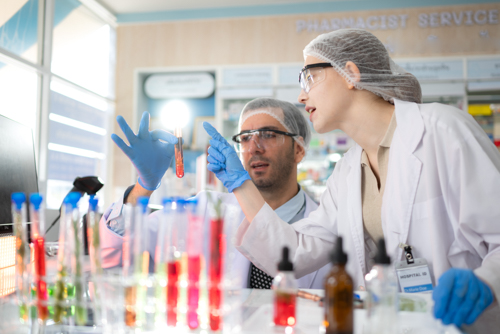Biomedical Engineering Technology
The Biomedical Engineering Technician program prepares students for essential careers in the healthcare technology field. This two-year program combines technical knowledge with hands-on training, equipping students to support and maintain medical equipment that healthcare professionals rely on daily.Students will develop a strong foundation in electronics, medical device troubleshooting, equipment calibration, and regulatory compliance, with a focus on patient safety and healthcare standards. Through practical lab experiences and industry-aligned coursework, students will learn to install, repair, and manage medical devices such as imaging equipment, patient monitors, and laboratory instruments.
Our program is designed for students who are interested in the intersection of healthcare and technology, and it provides the critical skills needed for success in hospitals, clinics, medical equipment manufacturing, and other healthcare facilities. Graduates of this program are well-prepared to enter the workforce as entry-level biomedical engineering technicians or pursue further specialization and certification in this rapidly growing field.
What will I learn?
The Biomedical Engineering Technician program offers a specialized curriculum designed to equip students with the technical and analytical skills needed to maintain and support essential healthcare technology. This academically rigorous program includes coursework in electronics, medical equipment technology, and regulatory compliance, preparing students to ensure the safety and functionality of a wide range of medical devices.Students engage in both theoretical studies and practical lab training, learning to troubleshoot, repair, and maintain complex medical equipment used in patient care, diagnostics, and laboratory analysis. Key components of the curriculum emphasize device calibration, equipment safety standards, and industry regulations, providing a comprehensive understanding of the responsibilities within healthcare technology management.
With a balance of foundational knowledge and hands-on experience, this program cultivates problem-solving abilities and technical proficiency, making graduates valuable assets in hospitals, clinics, and medical equipment manufacturing settings. The program also offers preparation for industry certifications, supporting students in advancing their careers in the evolving field of biomedical engineering technology.


What can I do with this Certificate
Graduates of the Biomedical Engineering Technician program have a variety of employability options across the healthcare technology and medical equipment industries. Here are some potential career paths:1. Biomedical Equipment Technician (BMET) – Maintain and repair medical devices in hospitals, clinics, and other healthcare facilities, ensuring safe and effective equipment operation.
2. Field Service Technician – Travel to healthcare facilities to install, troubleshoot, and repair medical equipment, providing vital support for medical device companies or third-party service providers.
3. Medical Equipment Repair Technician – Specialize in diagnosing, repairing, and calibrating medical devices, often working with equipment like patient monitors, ventilators, and imaging devices.
4. Clinical Engineering Technician – Work in healthcare settings to support clinical engineers, assisting in the maintenance and lifecycle management of medical technology.
5. Laboratory Equipment Technician – Manage and service laboratory instruments and devices, ensuring accuracy and reliability in diagnostic testing equipment.
With this degree, graduates are prepared for immediate entry-level roles or advancement opportunities in medical facilities, equipment manufacturing companies, third-party service providers, and other healthcare technology environments.
Degree Requirements
This is a 4-semester (60 SCH) degree program leading to the Associates of Applied Sciences in Biomedical Engineering Technician.
Program Credits: 57
Lecture Hours: 45
Lab Hours: 36
Lecture Hours: 45
Lab Hours: 36
There are no specific admission requirements for this program.
Learn more about tuition and special fees required for this program.